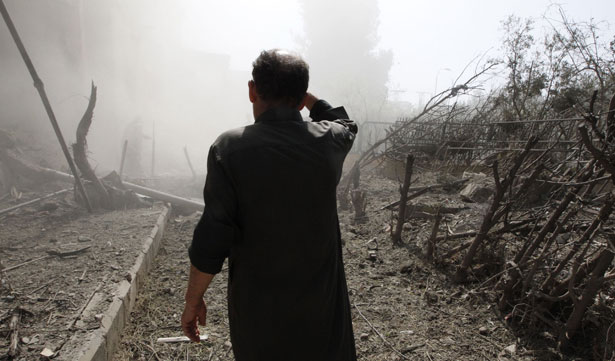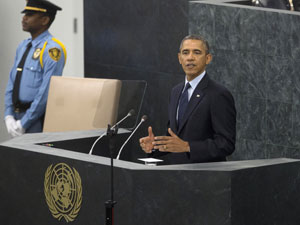
The Solution to War That Obama Doesn’t Want to Hear The Solution to War That Obama Doesn’t Want to Hear
If President Obama denounces military action, why is he preparing for another war in Iraq and Syria?
Sep 15, 2014 / Phyllis Bennis and N’Kosi Oates

The Speech on Diplomacy That Obama Should Have Given Last Night The Speech on Diplomacy That Obama Should Have Given Last Night
Not taking military action isn’t the same thing as doing nothing.
Sep 11, 2014 / Phyllis Bennis

Why Opposing the Israel Lobby Is No Longer Political Suicide Why Opposing the Israel Lobby Is No Longer Political Suicide
Our movement isn’t strong enough yet to end US enabling of the carnage in Gaza—but the shift in public discourse is a crucial first step.
Jul 15, 2014 / Phyllis Bennis

Pope Francis in Palestine Pope Francis in Palestine
Pope Francis’ seemingly impromptu prayer at Israel's apartheid wall hinted at a radical critique of Israel in an otherwise carefully orchestrated trip.
May 28, 2014 / Phyllis Bennis and Foreign Policy In Focus

5 Concrete Steps the US Can Take to End the Syria Crisis 5 Concrete Steps the US Can Take to End the Syria Crisis
We in civil society must sharpen our demands.
May 14, 2014 / Phyllis Bennis

Promoting a ‘Right to Heal’ From Fort Hood to Abu Ghraib Promoting a ‘Right to Heal’ From Fort Hood to Abu Ghraib
Veterans of the Iraq and Afghanistan wars are holding the US government accountable for innocent victims on all sides of the fighting.
Apr 16, 2014 / Phyllis Bennis and Foreign Policy In Focus

Reading Obama’s Iran Speech Reading Obama’s Iran Speech
President Obama’s speech at the UN reflected extraordinary shifts in global politics and the possibility of a new approach to US-Iran relations.
Sep 25, 2013 / Phyllis Bennis

Moral Obscenities in Syria Moral Obscenities in Syria
The threat of a reckless US-led assault on Syria is looking closer than ever, but politically-motivated military strikes will only make a horrific war even worse.
Aug 27, 2013 / Phyllis Bennis and David Wildman

Way Worse Than a Dumb War: Iraq Ten Years Later Way Worse Than a Dumb War: Iraq Ten Years Later
We owe the people of Iraq an enormous debt.
Mar 18, 2013 / Phyllis Bennis

The Antiwar Case for Chuck Hagel The Antiwar Case for Chuck Hagel
Chuck Hagel is no leftist. But he has stood up to AIPAC, the defense industry and the neocons.
Jan 16, 2013 / Feature / Phyllis Bennis
